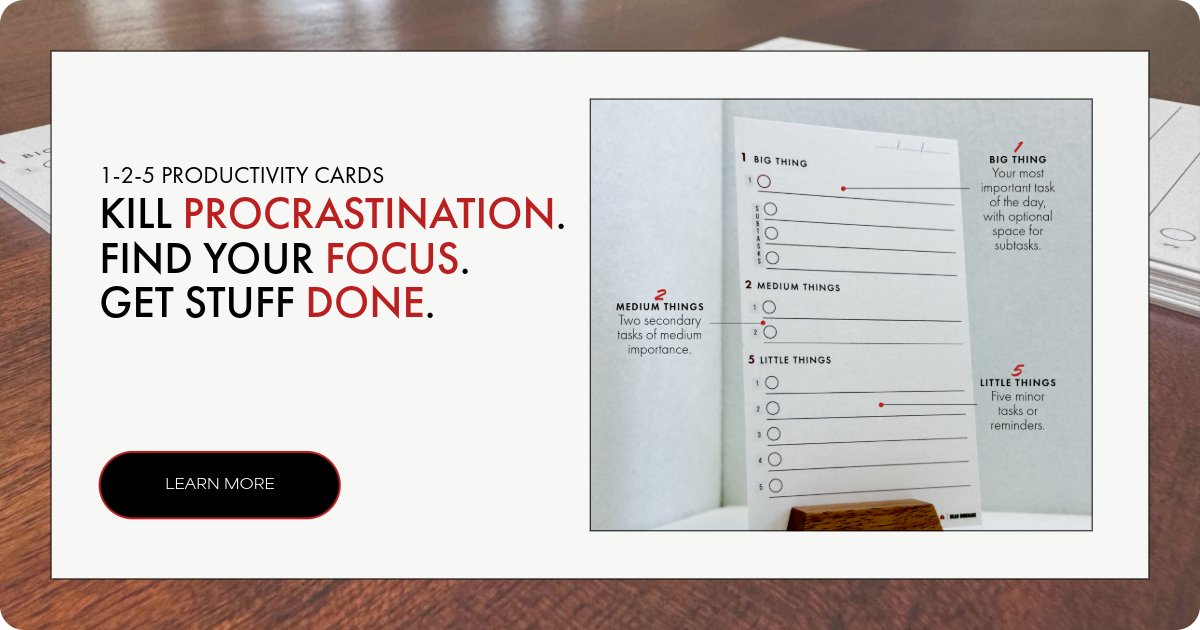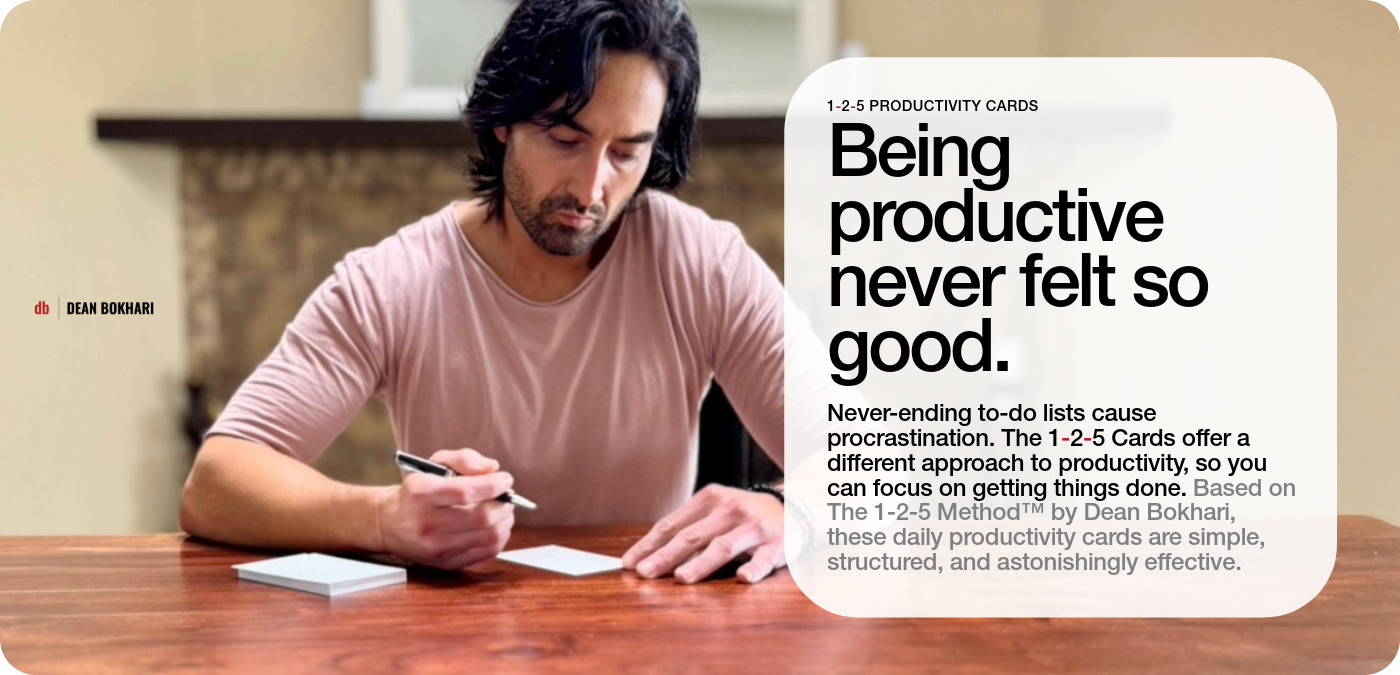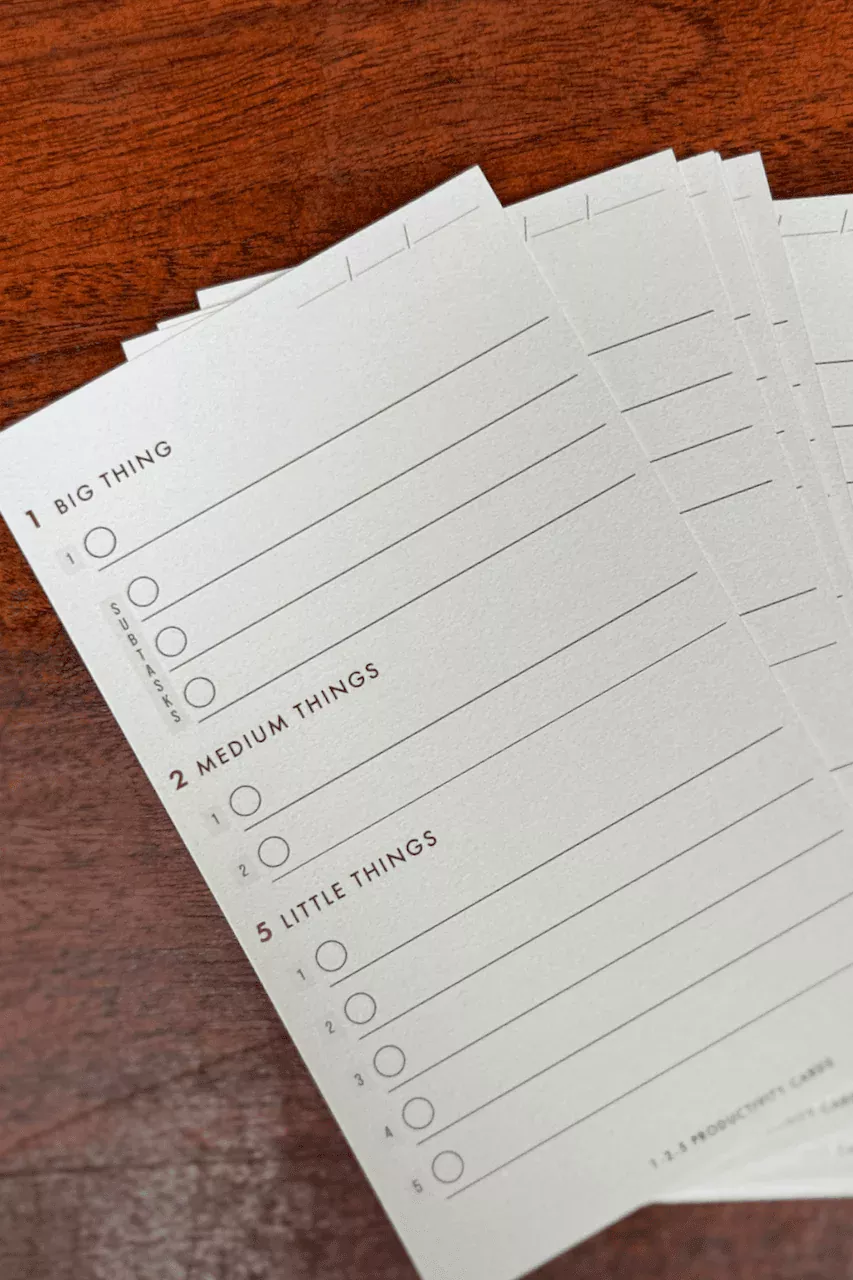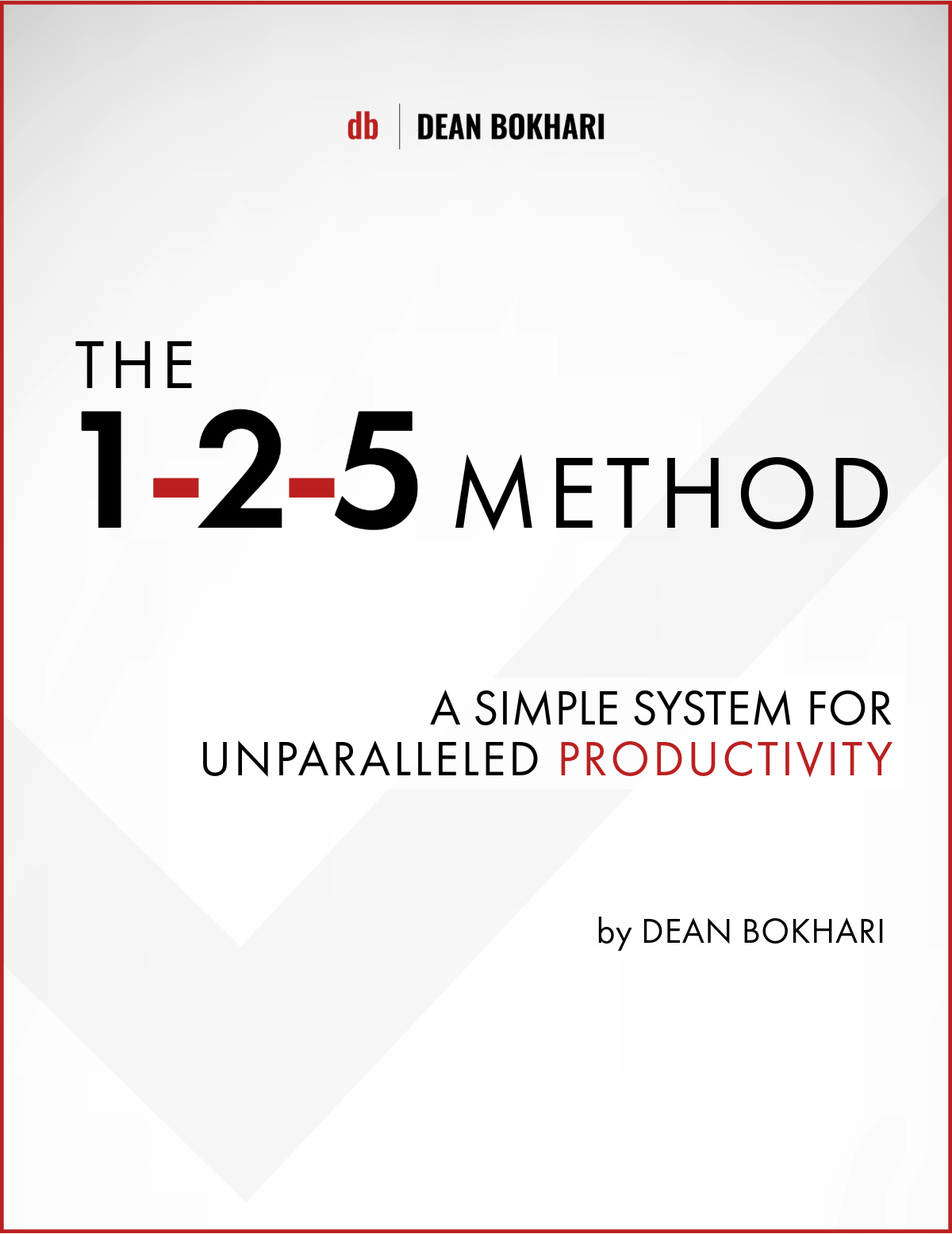how to stop procrastinating

Menu: Read | Listen | Notes
A Brief Guide on How to Stop Procrastinating
In this article/episode, you’ll discover:
- Why smart people procrastinate the most (and what to do about it)
- The single biggest reason why most people procrastinate (It’ll surprise you)
- 3 simple steps you can begin implementing immediately—like, right now—to STOP procrastinating and START crushing it, day-in and day-out
Ready? Pick your preferred method of following along—listen, read, or do both—and we’ll go ahead and dive right in…
Listen
Click the player to start streaming now, or click here to listen on iTunes
Read
QUESTION: What do you usually do to make yourself feel good about yourself on a daily basis?
Some people make themselves feel good by setting big goals, creating a game-plan of priorities to help achieve their goals, and then executing around those priorities on a day-to-day basis.
And then there’s that other group of people—the super-intelligent, super-smart, BIG thinkers that want to achieve the biggest dreams they can possibly envision… but somehow end up becoming ultra-stressed rather than ultra-successful.
How does this happen?
They’ve got ideas on top of ideas. They’ve got dreams of doing BIG things. They’ve even got the confidence and intelligence to help them make their dreams a reality… But for some reason, when it’s time to get down to business and do the work, they find themselves procrastinating on the stuff they KNOW they need to take action on.
So, what do they do to fix this procrastination problem?
Well, some of them try to numb it with booze. They try to forget about all the things they’ve been procrastinating on doing by having a drink or two (or ten). No harm in having a few drinks every now and then, but when one or two, turns into ten or more, then there’s something they’re trying to push down and forget about. It’s not for nothing that most people in rehab for alcohol addiction receive dual diagnosis treatment for a co-occurring mental health disorder. Alcohol has a habit of hiding the thoughts and feelings we’re trying to avoid.
We all know that alcohol is a depressant, but have you ever thought about why some people call it “liquid courage”?
Here’s what happens when people get a little booze in their system: first, there’s an initial surge of energy—the “liquid courage”—which allows them to forget about their problems and talk/behave in ways they normally wouldn’t…. But shortly thereafter, the energy drops dramatically. That’s why we call it a depressant.
But where does that initial spike of energy (or “courage”) come from?—Here’s where it gets interesting… Alcohol is actually depressing something—it’s shutting down the negative self-talk and the uncomfortable visions that are going on in your head.[1] When this happens–when the negative voice is your head shuts up—even for just for a little while—your energy skyrockets.
It’s almost a no-brainer when you think about it, right? Of course our energy will increase if we stop thinking about all the stuff we’ve been procrastinating on, and if we stop feeding our minds overwhelming images of not handling something successfully at work earlier in the day.
But here’s the big problem with numbing our negative thoughts with alcohol or anything else: the numbing is temporary.
The problems don’t disappear. The stuff we need to do doesn’t go away. And when we wake up the next morning, we still end up procrastinating on what’s most important. Except this time, we do it with a hangover!
And by the way, numbing the pain/anxiety/nerves can’t be done selectively either—when we numb ourselves long enough and often enough, it can get ugly… We risk numbing our source inspiration, purpose, and enthusiasm. That’s not going it help us stop procrastinating. It’ll just make us resort to procrastinating even more than before.
(Side note, I’m not saying drinking booze is bad. But obviously, anything in excess isn’t going to get you where you want to be in terms of optimizing your health and wellness.)
Why Smart People Procrastinate
QUESTION:
Why do the smartest people tend to be the ones that procrastinate the most?
You consider yourself smart, right?
Of course.
(I like to think of myself as a pretty smart fella, too, if I don’t say so myself!)
In fact, often times, it’s the smartest, most creative and capable people that end up procrastinating the most.
Naturally then, that leaves us wondering: if we’re so smart, then why the heck do we allow ourselves to keep procrastinating on important stuff?
Answer: Our bodies respond quite viscerally to the images we produce in our heads. In fact, your nervous system can’t differentiate between what you vividly imagine and what you actually experience in reality.[1]
Don’t believe me? Let me prove it to you right now…
YOUR BODY RESPONDS TO THE IMAGES YOU FEED IT.
Play along with me here, and imagine for just a second that you’re driving to the grocery store–the same one you usually go to…
You pull into the parking lot. You park your car. And you’ve got your grocery list ready to go.
As you walk into the grocery store, the first section you decide to head towards is the brightly lit fruits + veggies section … You immediately notice the big, giant citrus bins filled with oranges and grapefruits and lemons…
Turn your attention to the pile of big, fat yellow lemons.
For some odd reason, there’s a cutting board and a knife right next to that bin filled with lemons… Go ahead and grab the biggest, brightest, yellowest lemon you can find from the pile and put it on the cutting board…
Now take the knife and slice through the lemon. Notice the lemon juice trickling down the sides of the lemon, and dripping down onto the cutting board as the knife slices through the yellow zest of the lemon. Go ahead and cut the lemon right in half. Pause for a second and notice that citrusy-lemony smell in the air…
Now take one of the two halves of the lemon you just sliced, and slice that one in half too … Now you’ve got a quarter of a lemon … Now, grab the quarter-lemon off the cutting board, pop it in your mouth, and chomp down into it! (zesty!)
… If you played along, you probably noticed that the saliva content in your mouth actually increased a little bit.
Know how this happened?
Your body literally produced citric acid as a result of you vividly imaging yourself in the grocery store in front of those lemons.
In other words: it was all in your head.
Let’s think about this idea for a moment—if our bodies respond to the images we feed it, how can we expect to feel when we think about, say, doing our taxes?
When you think about how you have to do your taxes, do you tend to start visualizing positive images of success and completion? How about images of yourself taking action?
Probably not.
Now let’s think about this for a moment… Wouldn’t it make sense that the people who are the most creative and capable–those that can envision potential negative outcomes and consequences —are the ones that are more likely to procrastinate on something like, say, filing their tax returns? … Of course; but why? Because these are the folks that are sensitive enough to produce a vivid visualization of the worst-case scenarios and negative outcomes that could come about as result of doing their taxes…
What if it’s not done properly?
It’s going to take forever to collect all the receipts I need to prove some of the stuff I’m writing off.
What if I claim more than I should and get caught?
The forms look totally different this year.
Should I get a new accountant?
What if they screw it up and I get audited?
Oh no, tax fraud! Oh God, what if I’m jailed?
And on… and on… and on. Ad nauseam.
Bottom line? Procrastination is a FEELING.
In fact, often times, it’s the doe-doe-bird who just does whatever is in front of him without considering the positive/negative consequences of doing so. No priority. No long-term thought behind his action. He just plods forward like the dumb-dumb he is.
Smart people though — (like us!) — sometimes place themselves in a psychological jail-cell. And that’s what can so often cause us to procrastinate.
- For instance, just a quick glance at your tax forms (or whatever other daunting task) can send your sensitive—but intelligent—brain on a mental tangent of negative thought-patterns that go so deep they paralyze you from taking the first step.
Something to keep in mind: Nothing grows in ice. Far too often, folks allow their negative thoughts to FREEZE them from taking action and achieving success. To melt the ice, we need to decide to take action.
So how do we fix this procrastination problem?
The secret—stop procrastinating by intelligently “dumbing down” your brain.
In his book, Getting Things Done, David Allen discusses the power of “intelligent dumbing down” your brain by figuring out the NEXT ACTION.
It’s one of the most powerful ideas in the book (see book summary here)—just figure out the next action … and then DO IT.
Now, it’s no secret that procrastination causes lots of stress and pressure… but the way in which we relieve this pressure is where the secret comes in.
Here’s what you need to know if you want to learn how to stop procrastinating for good–you need to harness the power of DECISION.
- Actionable insight: If you want to stop procrastinating, you need to figure out the very next physical action you need to take to move something forward; be it a task, a project, a phone call, or whatever else.
You should also know that…
To stop procrastinating, the only thing you need to change is what you FOCUS on.
Want to learn how to stop procrastinating? Learn how to shift your focus.
Shifting your focus to something your mind perceives as do-able makes the difference that makes a difference.
Let me explain:
- Think about something you’ve been procrastinating on; like, finishing a presentation for work. Now FOCUS on how it makes you FEEL whenever you think about how you have to do that presentation.
- Now shift your FOCUS to ONE SIMPLE thing you can do right now to move this presentation even the tiniest bit closer to ‘done.’ Maybe you need to google some images to include in the presentation. That’s do-able, right? Make that you’re NEXT ACTION. Do it.
The rationale behind this Next Action method is simple: when you do something your mind perceives as do-able, your energy will go up, your sense of direction and drive will increase dramatically; and you’ll be able to motivate yourself to get whatever you need to get done—DONE!
- Actionable insight: Anytime you feel the procrastination creeping back up again, you should take it as a trigger to CHUNK down whatever you feel like procrastinating on into something simple and do-able… Even if it’s something as small as opening KeyNote and naming your presentation…
One small step leads to another… and another… and another… until, all of a sudden, “BIG MO” kicks in.
Do you know who “BIG MO” is? (Hint: The “MO” in “BIG MO” stands for Momentum…)
BIG MO = BIG MOMENTUM. And once you’ve got him on your side, you can move mountains.
Oh, and by the way: BIG MO (momentum) does not pick sides; you do … He’ll just follow you wherever you go. He’ll focus on whatever you focus on…
- If you focus on procrastinating, momentum rolls in that direction.
- If you focus on taking action, momentum rolls in that direction.
Momentum is like an ocean wave—it builds up slowly; seemingly unnoticable at first. But give it enough time, and it can turn into a force of nature capable of destroying everything in its path.
- Actionable insight(s): If you avoid taking action (procrastination), then the wave of momentum flows in that direction. But if you focus on chunking something down into a Next Action—a simple, do-able task you can take immediate action on—then the momentum rolls in that direction. And the more you focus on the positive–chunking down and taking action–the more momentum you build up … And the more momentum you build up, the more next actions you take … And the more next actions you take, the more things you get done … And the more things you get done, the you move towards taking your greatest dreams and turning them into reality.
LEARN HOW TO STOP PROCRASTINATING BY DEVELOPING THE “NEXT ACTION” HABIT
Here are some crucial quotes about harnessing the power of the Next Action to finally stop procrastinating—pulled from David Allen’s book, Getting Things Done:
"You are either positively drawn toward completing the action or reluctant to think about what it is and resistant to getting involved in it.
Often it’s simply the next-action decision that makes the difference between the two extremes. Thinking and deciding require energy. And when you notice something unfinished in your world but haven’t determined what the next action is yet, you’ll tend to be reminded of your fatigue and sense of being overwhelmed! Hence most people’s reaction to their own lists and organizers is negative— not because of the contents per se, but rather because sufficient appropriate thinking has yet to be applied to them.
In following up with people who have begun to implement [The GTD Methodology], I’ve discovered that one of the subtler ways many of them fall off the wagon is in letting their action lists grow back into lists of tasks or sub-projects instead of discrete next actions.
They’re still ahead of most people because they’re actually writing things down, but they often find themselves stuck, and procrastinating, because they’ve allowed their action lists to harbor items like:
“Meeting with the banquet committee”
“Johnny’s birthday”
“Receptionist”
“Slide presentation”
In other words, things have morphed back into “stuff” instead of starting at the action level. There are no clear next actions here, and anyone keeping a list filled with items like this would send her brain into overload every time she looked at it.
Is this extra work? Is figuring out the next action on your commitments additional effort that you don’t need to expend?
No, of course not. If you need to get your car tuned, for instance, you’re going to have to figure out that next action at some point anyway. The problem is that most people wait to do it until the next action is “Call the Auto Club for tow truck!”
So when do you think most people really make a lot of their next-action decisions about their stuff— when it shows up, or when it blows up?
And do you think there might be a difference in the quality of their lives if they handled this knowledge work on the front end instead of the back? Which do you think is the more efficient way to move through life— deciding next actions on your projects as soon as they appear on your radar screen and then efficiently GROUPING them into CATEGORIES of ACTIONS that you get done in certain uniform CONTEXTS, or avoiding thinking about what, exactly, needs to be done until it has to be done, then sputtering through your actions as you try to catch up and put out the fires?
Avoiding action decisions until the pressure of the last minute creates huge inefficiencies and unnecessary stress. That may sound exaggerated, but when I ask groups of people to estimate when most of the action decisions are made in their companies, with few exceptions they say, “When things blow up.”
The number one source of stress in the workplace—and the thing people complain about most—is CRISIS work. [2] … A huge portion of work-related stress comes from an overload of last-minute crisis work that’s consistently promoted and enforced by managers and leaders who failed to make the right decisions at the front end. In other words: when we’re not clear about the next physical action, we’re preparing to procrastinate.
- Actionable insight(s): You’re either attracted or repelled by the things on your list(s)—so make those things attractive by making them ACTIONABLE. Action is attractive, so let’s start taking more of it!
3-STEP RECAP — HOW TO STOP PROCRASTINATING AND START CRUSHING IT
- Do you have a list of ideas/tasks/to-dos that you’re not taking action (procrastinating) on? Go through it RIGHT NOW and write down a single, physical, NEXT ACTION you can take towards moving that idea/task/project/goal forward. Even if it’s something small. Make it actionable and DO IT.
The best way to beat procrastination is by way of taking deliberate action—yearly, monthly, weekly, daily, and in this very moment.
Here are 3 things to keep in mind if you want to finally get a handle on your procrastination problem:
- Understand that procrastination is a FEELING—We procrastinate because of the images we create in our mind’s eye about how pleasurable or how painful taking action on a given thing/task may or may not be.
- The secret to stop procrastinating is to SHIFT your FOCUS from “there’s so much stuff I have to do” to—> “what’s one simple thing I can do right now to move this project forward?”
- CHUNK it down and MAKE IT DO-ABLE. If you find yourself procrastinating on something, all you need to do is clarify + simplify—just take whatever you’re procrastinating on and figure out what the NEXT PHYSICAL ACTION you can take is. It doesn’t matter how small the action is, it just matters that there’s an action attached to the task/project that’s DO-ABLE, and capable of moving your project even 1/2 an inch closer towards completion.
Go get em’.
Notes
WHAT YOU’LL DISCOVER IN THIS EPISODE:
- 3 Steps To STOP Procrastinating
- Why Smart People Procrastinate and How To Stop
- How to Increase Focus, Boost Energy, and Become Insanely Productive
- Show Notes (url for this episode):
- Books Mentioned:
- Getting Things Done by David Allen
- Topics Covered:
- Productivity
- Procrastination
- How to stop procrastinating
- Question answered: “How can I stop procrastinating?”
- Subscribe / View Previous Episodes:
- (Flash)Books
- Too Busy To Read? Get top Business + Self-help Book Summaries you can read or listen to in under 20 minutes. Hundreds of titles to choose from for your iPhone, Android, Kindle or mp3 player. Get started for just $1 today at https://www.getflashnotes.com
- Audible
- Get a FREE audiobook download and 30 day free trial at Audible when you use this link: audibletrial.com/dean. Over 150,000 titles to choose from for your iPhone, Android, Kindle or mp3 player. Learn more and get started at audibletrial.com/dean
Wanna get your self-improvement questions answered on the podcast? Submit them here: MeaningfulHQ.com/contact.html or email them to me here: questions@deanbokhari.com
SOURCES:
LIVE LIKE YOU GIVE A DAMN,
Dean Bokhari
- If you find the podcast helpful, please rate + review it on Apple Podcasts »
- Got a Self-Improvement question you'd like me to cover? Submit it here »
"Dean Bokhari's Meaningful Show is the Self-Improvement Podcast I've been
waiting for. It's actionable, inspiring, and BS-Free." —Brett Silo
✨ New Series: How to Become an Early Riser
- Discover key methods to make early rising a habit
- How to wake up early + energized every morning
- Morning routines for health + success
Free self-development courses
👇
Tap on any of the courses below to start learning how to:
- boost your productivity (with GTD),
- get focused (with Deep Work),
- or learn the art of influencing others (with the How to Win Friends & Influence People course.)
All for free.
👇
Free life guides
👇
Best-selling Self-development courses by Dean Bokhari
Kill procrastination.
|
Get stuff done.
|
Get motivated.
|
Connect with anyone.
|
freshly pressed:
Top Audiobooks narrated by Dean Bokhari on audible | |
Book summaries
- The Power of Habit by Charles Duhigg
- 12 Rules for Life by Jordan B. Peterson
- Presence by Amy Cuddy
- Leaders Eat Last by Simon Sinek
- The ONE Thing by Gary Keller, Jay Pasan
- Deep Work by Cal Newport





































